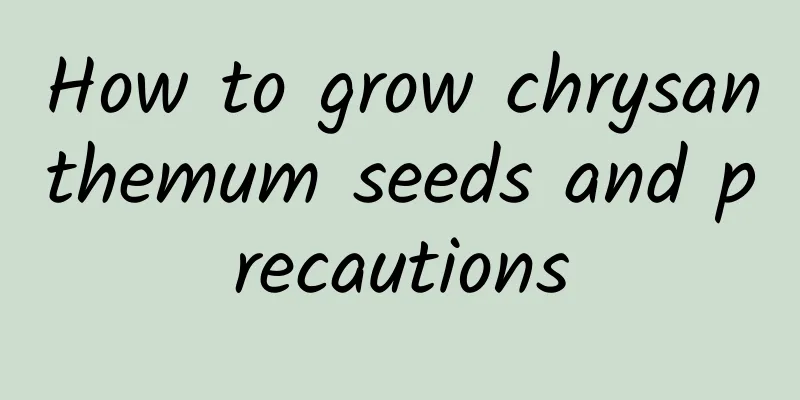How to grow chrysanthemum seeds and precautions

Chrysanthemum growth habitsChrysanthemum prefers a cool growing environment, with a suitable temperature of 18-21℃. It avoids waterlogging and prefers loam with high terrain, deep soil layer, rich in humus, loose, fertile and good drainage. It can grow in slightly acidic to slightly alkaline soil. It is a short-day flower, likes light, and requires sufficient light during the growth period. Chrysanthemum seed cultivation methodThe substrate for growing chrysanthemum seeds can generally be prepared by evenly mixing leaf mold, sandy soil and fertilizer cake residue. The growth temperature is controlled at 18-21°C. The maximum temperature in summer cannot exceed 32°C, and the minimum temperature in winter cannot be lower than 10°C. The plant needs to be given appropriate light, the light time should be reduced during the flowering period, and watering should be done when the soil is dry and wet. When planting, sufficient base fertilizer should be applied in the pot, and then nitrogen fertilizer should be applied every 10 days. Chrysanthemum seeds wateringIt is best to water chrysanthemum seeds appropriately according to the dryness of the soil. Water them again when the soil in the pot is slightly dry. Do not water them when it is in a humid state. You can water them every day in hot climates, but on cloudy and rainy days, you should control the water or stop watering directly. Fertilizing Chrysanthemum SeedsWhen chrysanthemum seeds are in different stages, different types of fertilizers are needed. Solid fertilizer is generally used as the base fertilizer during planting. Nitrogen fertilizer is used more during the growth period to promote the sprouting of branches and leaves. During the flowering period, it is best to use more phosphorus fertilizer and potassium fertilizer to promote flowering. Chrysanthemum maintenance precautions1. Change the pot every year Chrysanthemum seeds need to be repotted in time after one year of care, because the nutrients in the soil in the pot are basically consumed. It is necessary to replace it with new potting soil with sufficient nutrients to facilitate its vigorous growth. Repotting is usually done in spring. 2. Timely pruning Chrysanthemum seeds need to be pruned in time during the maintenance process. The side buds need to be cut off during the seedling stage to reduce nutrient consumption. When the buds are just beginning to form, the unnecessary buds need to be cut off to increase the amount of nutrients obtained by the remaining buds and help them bloom larger and brighter. |
<<: How to cultivate the evergreen tree and what to pay attention to
>>: Daisy growth environment conditions and characteristics
Recommend
How to make rose bonsai
Step 1: Picking piles The time for collecting pil...
How to propagate and transplant trumpet creeper
1. How to propagate trumpet creeper 1. Seed propa...
How to grow lucky bamboo
1. Breeding environment 1. Temperature: The growt...
If your home doesn't have enough sunlight, plant these 16 kinds of flowers and don't worry about them growing slowly.
Prunus truncatula The hanging bamboo plum is afra...
How to keep seeds of forget-me-not and how to plant them
How to save seeds of forget-me-not Forget-me-not ...
When is the best season to change the soil for potted wintersweet?
1. The season for changing soil Generally speakin...
Learn these 5 bonsai shaping techniques now!
(1) Direct dry type Bonsai trees have only one ma...
Why are the leaves of lilies turning yellow? How to save them
1. Pests and diseases Reason: If you do not pay a...
What fertilizer is good for fertilizing peace trees? There are 3 kinds of nutrient solutions and fertilizers for growing peace trees.
The peace lily has relatively high requirements f...
How big can a 2-3 cm silver carp fry grow in a year?
Silver carp is an important economic fish among f...
Common diseases of Saxifraga and their control methods
Common diseases of Saxifrage: Botrytis cinerea Sy...
Honeysuckle cultivation technology and management
Honeysuckle is widely favored by consumers for it...
What flowers are suitable for growing in Ningde? What are the city flowers and trees?
1. Climate characteristics of Ningde Ningde has a...
How many days does it usually take for water spinach to germinate?
Water spinach , also known as water spinach and w...
Can cat poop be used as fertilizer?
Cat poop as fertilizer Cat feces can be used as f...









